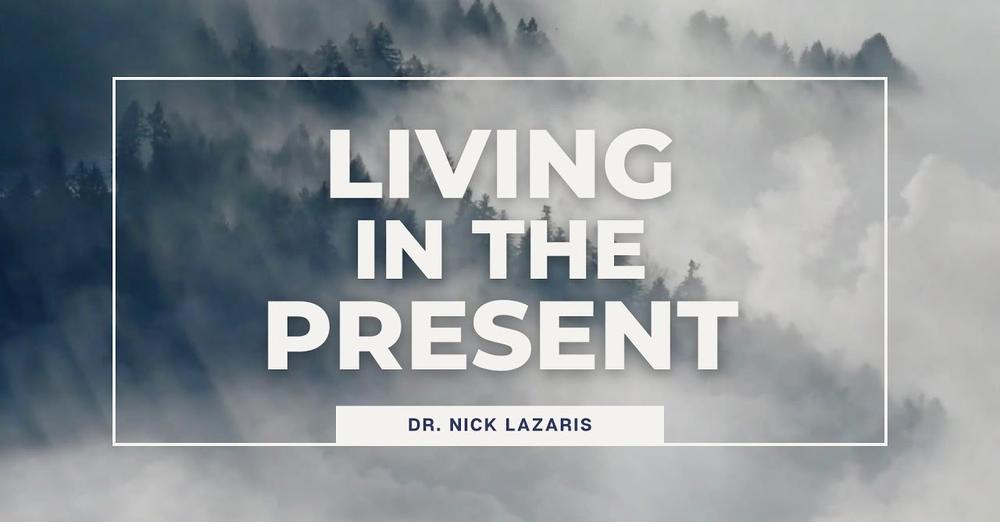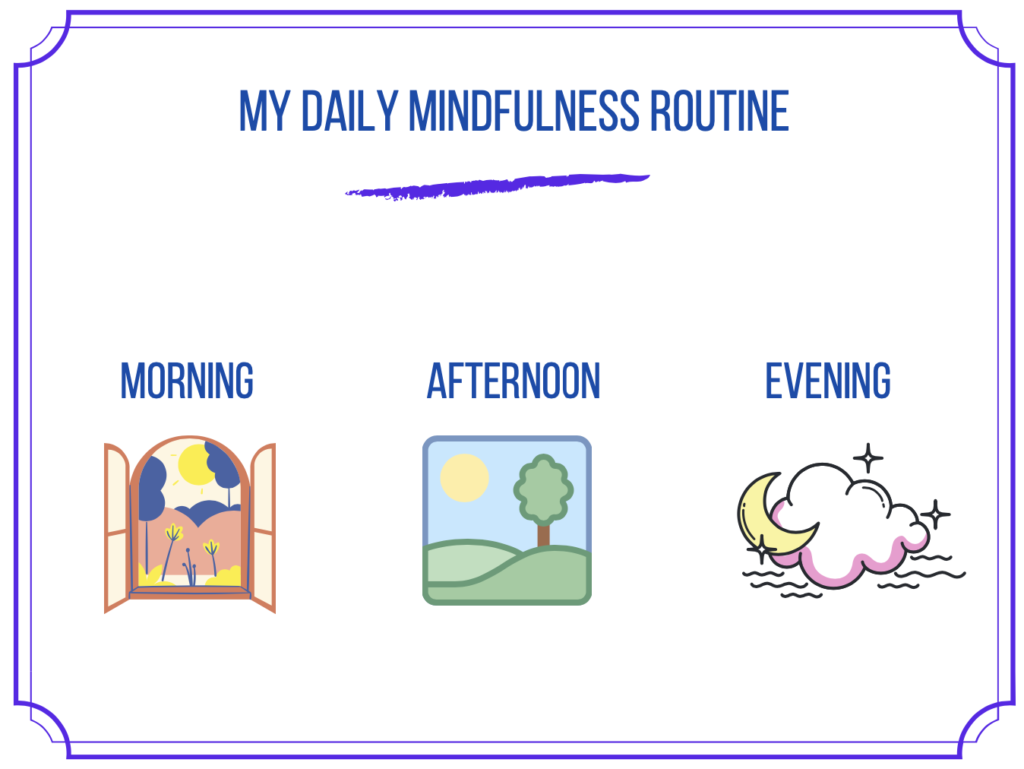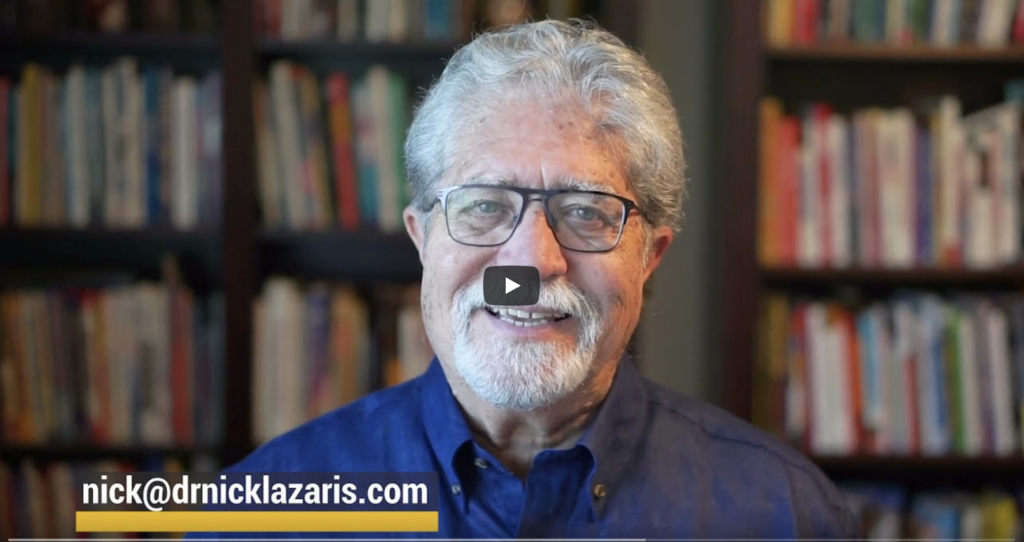
While most people live either in the regret of the past or in the anxious anticipation of the future, real living, as I share in this video, occurs in the present moment, in the NOW.
Click here to watch. I hope that you find it valuable!


While most people live either in the regret of the past or in the anxious anticipation of the future, real living, as I share in this video, occurs in the present moment, in the NOW.
Click here to watch. I hope that you find it valuable!

The process of staying present on a daily basis is such a challenging one. Our mind, from the moment we wake up until we hit the pillow at night, is FULL of so many thoughts, emotions, plans and fears, that it is a wonder we ever accomplish anything at all! And even if we do accomplish things, there usually is a price to pay of stress, burnout, anxiety and exhaustion.
With the rush of the Holiday Season, and everything that surrounds it, we are even less prepared to slow down and enjoy the moment.
To
help with the everyday tendency to emotionally and mentally be ‘on the
go’ with a busy overthinking mind, I created a very simple, yet
powerful, guide to help you stay focused throughout the days ahead.
I will be sharing more posts in the months ahead and ways to stay present, but to help right now, click here to receive your free PDF and begin your journey to create a Daily Mindfulness Routine.
The
Christmas Season is a time for joy! Yet, this can be a most difficult
time of the year for many. Stress, pressure, loneliness, expectations,
depression, hurts and financial burdens rob many of the joy of the
season.
With
Christmas seeming to come earlier each year (ornaments on sale in
July!) and the mad rush of traffic and the scramble to buy the ‘perfect’
gifts, the “Happy Holidays” often turn out to be anything other than
joyful or happy!
It has been said that “we are in danger of losing Christmas.” This is even true for those who are faith-based who, in the rush of things, lose that “glad feeling of happiness and delight” that should be at the center of the holidays.
The
challenge is that in order to handle the unique pressure and stresses
that accompany this time of year, we need to maintain a ‘balanced life.”
Problems that occur in our desire to experience joy are when our “whole being” is out of balance.
Let’s take a quick look at some very practical steps that we can take towards putting the joy back into Christmas:
1) Prepare Your Physical Self for the Holidays
~ Eat wisely – importance of healthful, nourishing foods (although a very hard time to diet!)
~ Rest appropriately – set boundaries on shopping, visiting and decorating – give your body time to refresh itself!
~ Exercise – “not something you spend time doing, but rather something you invest time in”
~ Strive for ‘Stress-Free’ living
– Give yourself permission to slow down and enjoy yourself; practice
positive self-talk; avoid comparing yourself to others; see yourself as a
valuable child of God; give yourself permission to take risks
2. Evaluate Your Soul (Your emotional/relational self)
~ Evaluate your expectations and give them up to God
– “idealized holidays” can set us up for unfulfilled expectations
(false TV and social media images); continually check out your
expectations and let them go
~ Set priorities for the holidays – Ask yourself, “What is REALLY important?”; Learn to say “No”; Build your own holiday traditions (make then uniquely YOURS!)
~ Keep things in financial perspective
– Develop a reasonable spending plan and stick to it; Communicate
limitations to your children (align their expectations with reality);
avoid the ease of buying on credit (which discourages creativity and
planning and can lead to financial bondage)
~ Decide to resolve hurtful feelings
– examine and resolve any lack of forgiveness towards others; forgive
yourself (let go of unresolved guilt & shame); recognize and work on
pain from the past (hurts and losses)
~ Experience the childlike joy of Christmas
– be yourself; be spontaneous; rid yourself of perfectionism; develop
the eyes, ears and mouth of a child – look at Christmas differently …
listen with new ears … be silly … have fun!
3. Focus on the Miracle of Christmas
~ Don’t neglect your spiritual needs;
plan to make the holidays a time of spiritual and emotional growth;
real joy, especially as a faith-based person, comes from the realization
of what Christmas is really all about and from knowing the one whose
birth we celebrate, as Paul in scripture wrote so many years ago,
“Thanks be to God for His indescribable gift!”
During this Holiday season I encourage you to:
~ Prepare yourself physically
~ Evaluate the expectations you have for the Season
~ Set realistic priorities
~ Evaluate your emotional and relational life
~ Set your inner child free to fully enjoy the season!
~ Focus on the Miracle of Christmas
Do you feel that your life is moving at a faster and faster rate? Do you feel out of balance and at the mercy of stress?

While stress is not an option, how you deal with and bounce back from it is.
A commitment to balance, which includes self-renewal, is crucial in order to be outrageously successful in all areas of your life. Prioritizing self-renewal allows for you to become physically and mentally refreshed while having the energy to stay focused on your vision and goals.
“If the snooze button on your alarm is getting as worn out as you are, wake up. You may be burning out.” ~Patti Bond
Preventing Burnout Through Self-Renewal:
1) Slow it Down!
Our culture gives very little help with slowing down our life. In fact, it seems as if everyday we are encouraged to do things quicker or are offered ways to speed things along. Fast food, faster internet, shorter deadlines, shopping from home in order to get things as soon as possible are not much help with slowing down our lives.
Ask Yourself: Am I feeling stressed and overwhelmed? Do I need to slow down and take some purposeful time alone or in personal refreshment and renewal?
“Without great solitude, no serious work is possible.” ~ Pablo Picasso
Keys to slowing down and discovering time alone:
– Look for small moments of quiet time to slow down (before your family awakens, short walks where you enjoy the air, smells and sunshine around you)
– Find ‘quiet places’ for silence and solitude (turn off the music, TV, and email and spend time in silence, alone with your thoughts and your self)
– Minimize your words (Speak less and ‘listen’ more when alone,
meditate/listen to the inner voice of God, listen to and become aware of
that part of yourself that you have been ignoring through all of the
‘noise’ and your busyness)
2) Take Time Off
– Whether a vacation, a half-day break from it all, or 15 minutes to breath and re-focus (see my post on Focused Breathing) , make sure that it is really time off (no cell phone, email, planning your next business strategy). Purposely take the time to refresh and relax!
– Decide ahead of time what you really need. It might be a quiet, relaxing time without the kids or possibly an exciting activity that rejuvenates your brain and gets you ready for your next project or activity.
3) Stop Postponing Joy
We can become so preoccupied and focused on our work related activities that we lose our perspective on the ‘big picture’. The more stressed and ‘serious’ we become, the less we are creative, spontaneous and joyful in our work and life.
Are you allowing yourself to laugh and have fun in your work and life or are you being so ‘adult’ that passion has been replaced by an ongoing lack of creativity.
Childlike renewal involves allowing yourself to slow down when necessary, letting go of the seriousness of it all while experiencing the joy of living!
“In times of joy, all of us wish we possessed a tail we could wag.” ~ W.H. Auden
Slow down and give the childlike part of yourself permission to play, to be outrageously creative in your art, performing and business. Tackle your next project with an innocent, trusting, spontaneous, creative and risk-taking way!
Is it possible to eliminate all stress from our lives? As I mentioned above, that is not an option. Yet, a commitment to how we respond to stress is under our control. Create a balanced life by slowing down, taking time off and experiencing more joy in your life.
Question: Which of the 3 Steps would make the most difference in your life right now? I’d love to hear your thoughts!
I’d like to share a short video message with you (just click on the image below):

Click HERE to receive your free E-Book, The Psychology of Fearless Achievement.
All my best,
Dr. Nick
P.S.
I’d love to hear your thoughts regarding what you learn from my e-book! Email me at nick@drnicklazaris.com

As a creative, entrepreneur or businessperson, the ability to present yourself and speak without fear is CRUCIAL to your success. If you struggle with a fear of public speaking when giving an on-site presentation, or experience anxiety when promoting your services or products on a Zoom call or Facebook Live, then signing up for my free upcoming Masterclass is just what you need! I invite you to attend a free 1-hour Fearless Speaker Master Class by clicking on the image above to learn more and register.
Do you strive for flawlessness in your art while setting excessively high standards for yourself?
Do you desire for your writing, art, business idea or performance to be perfect before you put it out to the world?
Do your critical self-evaluations and fears about what others will think stop you dead in your creative tracks and stuck in a no man’s land between your creative potential and discouragement?
It’s time to break out of prison.

Suzanne was desperate as she called my office. It had been many years since she had entered her prison of perfectionism and was desperate to see if I could help her break out.
An amazing French Horn player, Suzanne knew how to play all the correct notes and, although technically on the mark, was continually held back by her desire to perform perfectly while avoiding making a mistake.
In tears, she shared that she had tried almost everything in an attempt to break free, but nothing seemed to work.
With an important audition coming up, she found herself sitting in her emotional prison cell, afraid to perform with passion, convinced that her abilities were not enough and that she would never accomplish her dreams of becoming a professional musician.
Her drive towards perfectionism led to emotional paralysis, resulting in poor performing and a continued sense of shame. She had come to replace passion and freedom with a prison of perfectionism.
I agreed that it was time for Suzanne and I to plan her ‘prison break’.
4 Steps to Breaking Out of the Prison of Perfectionism:
PRISON BREAK STEP 1 – Replace Your Unrealistic Expectations “The artist who aims at perfection in everything achieves it in nothing.” – Eugene Delacroix
By setting excessively high performance standards, passion gets replaced with a focus on the mechanical or technical. Although it is critical to develop skills and practice technique, when its time to go for it, let go and perform with passion.
Have you ever heard a Speaker who is so polished that their lack of authentic passion puts you to sleep? Wake up those around you by giving yourself permission to go for it.
The big lie is “Performing (or creating) means doing things perfectly, without any flaws.” “Have no fear of perfection – you’ll never reach it. “ ~Salvador Dali
PRISON BREAK STEP 2 – Stop Your Critical and Judgmental Beatings
The perfectionist is overly critical with their self-evaluations and concerns regarding what other people think.
By listening to the critical voices in our head we risk our unique voice being silenced.
English writer G.K. Chesterton said, “If something is worth doing, it is worth doing badly.”
Perfectionism never comes and its pursuit never ends! Allow yourself
to do poorly, to create “bad” work, to stop being self-critical. Tell
that inner voice to be quiet – it’s time to have some fun creating and
performing.
PRISON BREAK STEP 3 – You Are Not What You Create
When we over identify with our work, we run the risk of believing that our worth and value is based on how well we create, on how others perceive our work.
Perfectionism can lead to a cycle of shame (“I’m not good enough” … “Who do I think I am?”) that leads to playing it safe and putting off letting the world see our work (“It’s better to wait until it’s perfect than face possible rejection.”)
When things are going well, a perfectionist feels like they are valuable and important, yet, if it does not go perfectly, then their sense of self and esteem goes down the drain.
Breaking out of prison includes believing that as much as I want my
work to be accepted, I am still of value no matter what the response is.
“I’m not what I ought (or was created) to be, but I’m not what I used to be,
and by God’s grace, I’m not what I’m going to be.” ~Josh McDowell
PRISON BREAK STEP 4 – Focus on the Process, NOT the Outcome
As we focus on a perfect outcome, our level of fear and anxiety rises, which then interferes with our creative process. Perfectionism takes us on a journey from risk-taking and creative exploration to feeling imprisoned with self-doubt.
Perfectionists become obsessed with the final outcome of their
creative efforts and step out of the present into the future filled with
anxiety.
“If you wait for perfect conditions, you will never get anything done (or shipped!)”
~Ecclesiastes 11:4
A key to breaking out of our self-imposed prison is focusing on being present and mindful with realistic process goals. Breath slowly and fully before you attempt to break free. Stay present in the moment with your art and creativity, and do not look too far ahead in anxious anticipation.

“Aim for success, not perfection. Never give up your right to be wrong, because then you will lose the ability to learn new things and move forward with your life. Remember that fear always lurks behind perfectionism. Confronting your fears and allowing yourself the right to be human can, paradoxically, make you a far happier and more productive person.” ~ Dr. David M. Burns
To sum up our Prison Break Plan:
1) Start with realistic expectations
2) Move creatively forward without critical and judgmental thinking
3) Finish your work with out over identifying with it
4) Move on to your next project, returning to a focus on the process
Enjoy your freedom!
Question: As you plan your own ‘prison break’ out of perfectionism, which step is most crucial for you to begin with? Would you like to add any other steps to the Plan?